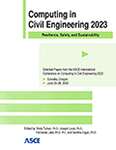Social Media Data Mining of Stakeholder Value Systems on Community Resilience in Florida
Publication: Computing in Civil Engineering 2023
ABSTRACT
Building disaster-resilient communities requires a better understanding of what community stakeholders value regarding resilience. Communities with various characteristics (e.g., geographic, demographic, social vulnerabilities) are expected to prioritize resilience strategies to align with the value systems of their stakeholders. Stakeholder values include the aspects that are of importance, merit, and provide utilities to them, and stakeholders from different communities may hold values with varying degrees of importance, forming their distinct value systems. Despite the importance of involving stakeholders in resilience planning, there is limited awareness of stakeholder value systems with respect to resilience planning. To address this gap, this study focused on identifying stakeholder value systems and analyzing how the value systems vary across different communities (i.e., coastal vs. inland; metropolitan vs. non-metropolitan; more vs. less socially vulnerable). A semi-supervised learning technique—anchored correlation explanation (anchored CorEx)—was used to analyze the social media data (i.e., Twitter) collected within the Florida communities. The results demonstrate that communities with various characteristics have significantly different priorities regarding several stakeholder values. The findings of this study could inform policymakers to better plan for community resilience by aligning their strategies with stakeholder value systems, thereby increasing the effectiveness and efficiency of implementing resilience practices.
Get full access to this article
View all available purchase options and get full access to this chapter.
REFERENCES
Ashmawy, I. K. I. M. (2020). “Stakeholder involvement in community resilience: evidence from Egypt.” Environ. Dev. Sustain., 23 (5): 7996–8011.
ATSDR (Agency for Toxic Substances and Disease Registry). (2022). “CDC SVI Documentation 2020.” <https://www.atsdr.cdc.gov/>(Jan. 10, 2023).
Bathi, J., and H. Das. (2016). “Vulnerability of Coastal Communities from Storm Surge and Flood Disasters.” Int. J. Environ. Res. Public Health., 13 (2): 239.
Bayabil, H. K., Y. Li, J. Crane, B. Schaffer, A. Smyth, S. Zhang, E. A. Evans, and T. Blare. (2022). “Saltwater Intrusion and Flooding: Risks to South Florida’s Agriculture and Potential Management Practices.” EDIS., 2022(3).
Chandrasekaran, R., V. Mehta, T. Valkunde, and E. Moustakas. (2020). “Topics, Trends, and Sentiments of Tweets About the COVID-19 Pandemic: Temporal Infoveillance Study.” J. Med. Internet Res., 22 (10): e22624.
Desportes, I., J. Waddell, and M. Hordijk. (2016). “Improving flood risk governance through multi-stakeholder collaboration: A case study of Sweet Home informal settlement, Cape Town.” S. Afr. Geog. J., 98 (1): 61–83.
EESI (Environmental and Energy Study Institute). (2020). A Resilient Future for Coastal Communities: Federal Policy Recommendations from Solutions in Practice. Washington, D.C.: EESI.
Gallagher, R. J., K. Reing, D. Kale, and G. Ver Steeg. (2017). “Anchored Correlation Explanation: Topic Modeling with Minimal Domain Knowledge.” Trans. Assoc. Comput. Linguist., 5 (Dec): 529–542.
Gosain, P., L. Zhang, and N. E. Ganapati. (2022). “Understanding multisector stakeholder value systems on housing resilience in the City of Miami.” Int. J. Disaster Risk Reduct., 77 (Jul): 103061.
Kotsiantis, S. (2007). “Supervised Machine Learning: A Review of Classification Techniques.” Inform. Slov., 31(3): 249–268.
Laerd Statistics. (2022). “Laerd statistics.” <https:// statistics.laerd.com/> (Mar. 10, 2023).
Li, Q., M. Roy, A. Mostafavi, and P. Berke. (2021). “A plan evaluation framework for examining stakeholder policy preferences in resilience planning and management of urban systems.” Environ. Sci. Policy., 124 (Oct): 125–134.
Mahdawi, A. (2022). “Hurricane Ian was less a natural disaster than a human-made one. We must stop building on swamps.” <https://www.theguardian.com/commentisfree/2022/oct/05/hurricane-ian-was-less-a-natural-disaster-than-a-human-made-one-we-must-stop-building-on-swamps> (Mar. 15, 2023).
NOAA (National Oceanic and Atmospheric Administration). (2022). “Hurricanes in History.” <https://www.nhc.noaa.gov/outreach/history/>(Jan. 20, 2023).
Pathak, A., L. Zhang, and N. E. Ganapati. (2020). “Understanding multisector stakeholder value dynamics in Hurricane Michael: Toward collaborative decision-making in disaster contexts.” Nat. Hazards Rev., 21 (3): 04020032.
Pyke, J., A. Law, M. Jiang, and T. de Lacy. (2018). “Learning from the locals: the role of stakeholder engagement in building tourism and community resilience.” J. Ecotourism., 17 (3): 206–219.
Ren, H., L. Zhang, T. A. Whetsell, and N. E. Ganapati. (2023). “Analyzing Multisector Stakeholder Collaboration and Engagement in Housing Resilience Planning in Greater Miami and the Beaches through Social Network Analysis.” Nat. Hazards Rev., 24 (1): 04022036.
Sitas, N., B. Reyers, G. Cundill, H. E. Prozesky, J. L. Nel, and K. J. Esler. (2016). “Fostering collaboration for knowledge and action in disaster management in South Africa.” Curr. Opin. Environ. Sustainability., 19 (Apr): 94–102.
Taeby, M., and L. Zhang. (2019). “Exploring stakeholder views on disaster resilience practices of residential communities in South Florida.” Nat. Hazards Rev., 20 (1): 04018028.
Tompkins, E. L., R. Few, and K. Brown. (2008). “Scenario-based stakeholder engagement: Incorporating stakeholders preferences into coastal planning for climate change.” J. Environ. Manage., 88 (4): 1580–1592.
USCB (United States Census Bureau). (2021). “Emergency Management Coastal Areas.” <https://www.census.gov/>(Jan. 24, 2023).
United States Office of Management and Budget. (2010). “2010 Standards for Delineating Metropolitan and Micropolitan Statistical Areas”. <https://www.govinfo.gov/> (Jan. 10, 2023).
Information & Authors
Information
Published In
History
Published online: Jan 25, 2024
ASCE Technical Topics:
- Alignment
- Analysis (by type)
- Buildings
- Business management
- Data collection
- Design (by type)
- Disaster risk management
- Disasters and hazards
- Engineering fundamentals
- Geometrics
- Highway and road design
- Infrastructure
- Lifeline systems
- Methodology (by type)
- Practice and Profession
- Research methods (by type)
- Social factors
- Structural engineering
- Structures (by type)
- System analysis
- Urban and regional development
- Urban areas
- Utilities
Authors
Metrics & Citations
Metrics
Citations
Download citation
If you have the appropriate software installed, you can download article citation data to the citation manager of your choice. Simply select your manager software from the list below and click Download.
